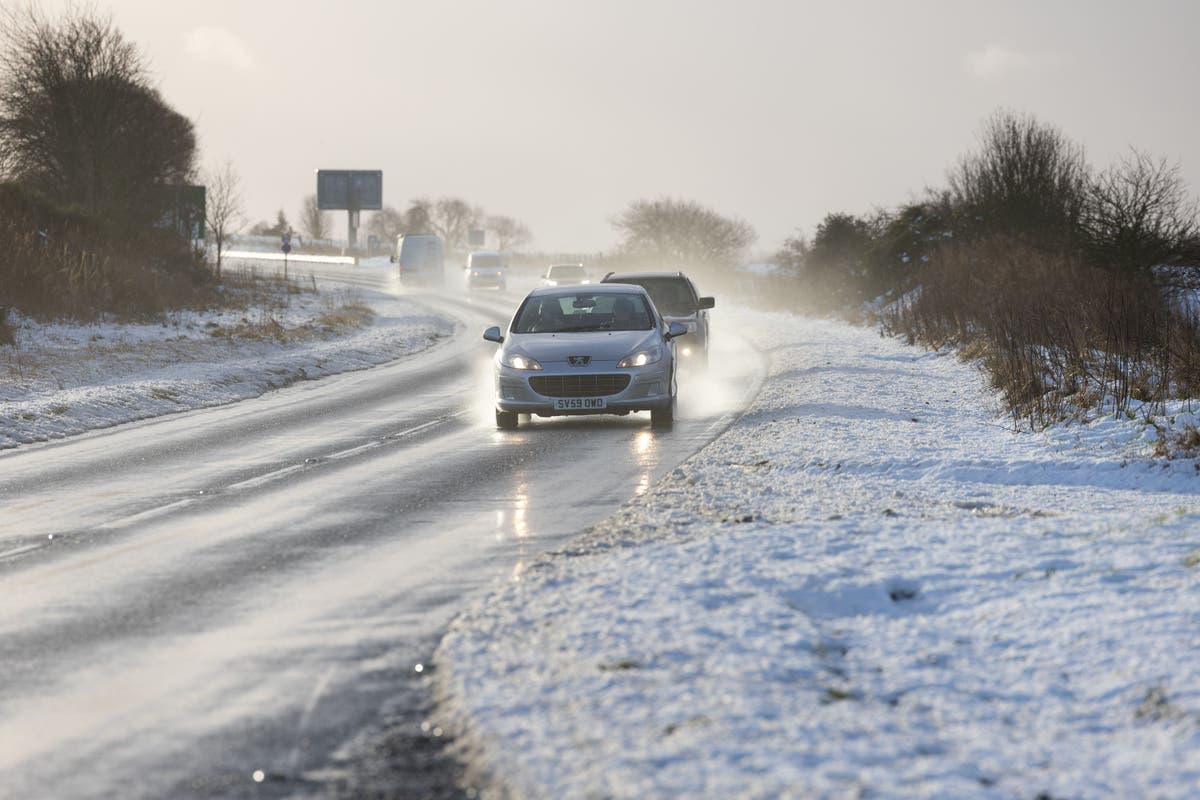Britons wanting to travel home after the New Year have been warned to expect travel disruptions on Thursday, as icy weather grips the UK.
The Met Office has warned that the country will be welcoming 2025 with a cold snap with snow expected to fall over the first weekend of the year.
On Thursday, more ice and snow warnings were issued across much of Scotland, northwest England and parts of Northern Ireland.
Temperatures are expected to stay low in the first days of the year, with air from much further north flowing across the country.
For those who intend to travel despite the current wintry weather, both the Met Office and National Rail issued alerts to remind Britons to plan ahead if on the move on Thursday.
Difficult driving conditions should be expected, particularly within areas under a yellow weather warning. Allowing extra time is also advised, with delays, diversions, or hampered conditions likely for road users.
open image in gallerySnow touched the ground in the west end of Aberdeen on Thursday (Beth Edmonston/PA Wire)
For those using public transport, passengers are advised to check any timetables and services before setting out in case of delays or cancellations due to inclement weather.
As per National Rail, the poor weather will impact trains running across Great Britain, with Northern services, TransPennine Express services, Transport for Wales services and ScotRail services all impacted.
Thursday will otherwise be fine and dry for most, the Met Office reports, although the temperature will feel much colder than the true mercury figure, with the chill expected to continue into Friday.
Met Office meteorologist Tom Morgan said: “At the moment we’ve issued a very large snow warning for Saturday until Monday but it doesn’t mean that everywhere within that warning could see snow, it’s just a heads-up there could be some impacts.”
It comes after many in Greater Manchester woke up on New Years day to devastating flooding, with the police declaring a major incident as people were forced to evacuate.
Around 450 people were evacuated on Wednesday evening from a Didsbury hotel while 400 homes were at a lower risk with no widespread evacuation needed, police said.
open image in galleryAround 450 people were evacuated on Wednesday evening from a Didsbury hotel (REUTERS)
Two new flood alerts were issued just prior to 6am on Thursday, with river levels peaking for both the Lower River Wharfe system in Yorkshire and Lower River Ure waterway in North Yorkshire.
Britons in areas affected by flooding are advised to avoid using low-lying footpaths, or any bridges near local watercourses, and to not attempt to walk, drive or cycle through flood waters, with officials advising that if the area is flooded, then forget it.
A number of train routes were disrupted or blocked by flooding on Wednesday, mainly in the North West of England, with some Northern services, TransPennine Express services, Transport for Wales services, and South Western Railway services affected.
National Highways said a section of the A628 Woodhead Pass between Woolley Bridge and Flouch was closed due to flooding, as was the westbound M56 between Junction 6 for Manchester Airport and Junction 8 for Bowdon.
No further significant rainfall is expected for Thursday in the area, with water levels expected to begin falling in the coming hours.
open image in galleryA yellow warning for snow will be in place until Monday morning (Met Office)
But more disruptive weather is expected to come, with a three-day yellow warning for snow issued for almost all of England and Wales and parts of Scotland this weekend, as the Met Office warned that rural communities could become cut off.
Schools could potentially be closed and there is a chance of power cuts and road closures as well as delays and cancellations to flights and trains, the forecaster said.
A yellow warning is in place from noon on Saturday until 9am on Monday and covers all regions of England other than the South West, the majority of Wales and parts of southern Scotland.
About 5cm of snow is expected widely across the Midlands, Wales and northern England, with as much as 20-30cm over high ground in Wales and/or the Pennines, the forecaster added.
